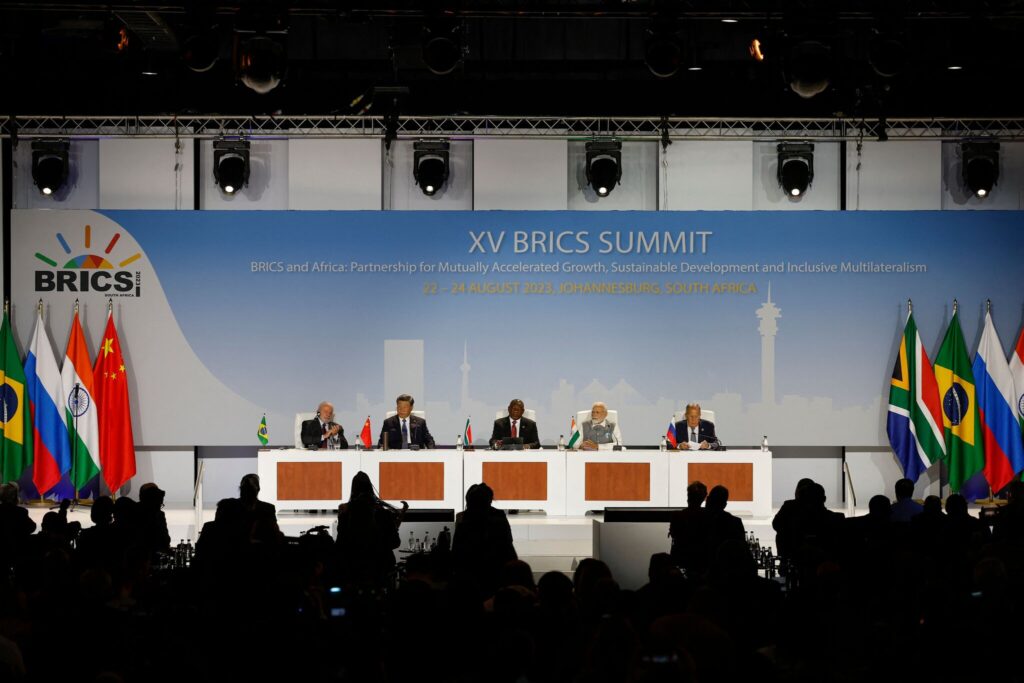Johannesburg, August 28, 2023 – The recently concluded BRICS Summit in Johannesburg marked a pivotal moment in global diplomacy, as leaders from Brazil, Russia, India, China, and South Africa gathered to discuss key issues and set the agenda for international cooperation. This year’s summit saw China emerge as a prominent player, leveraging economic growth and geopolitical influence through the addition of six new members, including oil-producing giants Saudi Arabia, Iran, and the UAE.
China’s Strategic Gains: Amid a rapidly evolving global landscape, China’s position was elevated as it welcomed Saudi Arabia, Iran, and the UAE into the BRICS fold. The inclusion of these oil-producing nations not only expands the alliance’s economic reach but also consolidates China’s role as a leader in global energy diplomacy. By forging deeper ties with these key oil producers, China enhances its energy security and broadens its geopolitical footprint.
Controversy and Concerns: However, the decision to include Saudi Arabia, Iran, and the UAE has not been without controversy. Critics point to the sketchy track record of these nations concerning women’s rights and equality. The human rights records of Saudi Arabia and Iran have faced international scrutiny, and concerns persist about the treatment of women within their societies. The BRICS Summit’s spotlight on these nations brings these concerns to the forefront, raising questions about the extent to which such issues were addressed in the negotiations for their inclusion.
Call for UN Reform: One of the key takeaways from the summit was the collective call for comprehensive reform of the United Nations (UN), particularly its Security Council. The BRICS nations, including Brazil, India, and South Africa, have advocated for a more democratic, representative, effective, and efficient UN system. Emphasizing the need to increase the representation of developing countries in the Security Council, the BRICS members aim to enhance the Council’s ability to address global challenges and support the aspirations of emerging and developing countries from Africa, Asia, and Latin America.
Shaping Global Diplomacy: The BRICS Summit’s outcomes reflect a shifting global order, with emerging economies asserting their influence in shaping international affairs. As the alliance expands to include diverse players such as Saudi Arabia, Iran, and the UAE, debates about human rights, gender equality, and geopolitical alignment gain prominence. At the same time, the call for UN reform underscores the group’s commitment to reshaping global institutions to better reflect the multipolar world order that is taking shape.
Promotion of Local Currencies: One of the key takeaways from the summit was the unanimous push for greater utilization of local currencies in international trade settlements. This move is aimed at reducing the reliance on a handful of dominant global reserve currencies, such as the US dollar and the euro. By transacting in local currencies, BRICS nations seek to diversify their economies and reduce the vulnerability associated with exchange rate fluctuations and the potential impacts of monetary policy decisions made by countries with reserve currency status.
The adoption of local currencies for trade and transactions offers several potential advantages. First, it reduces the direct exposure of BRICS nations to fluctuations in the value of external reserve currencies. Second, it can lead to lower transaction costs, as there would be no need to convert currencies through intermediaries. Third, it strengthens economic ties among BRICS members, fostering increased cooperation and trade. Lastly, promoting local currencies empowers these emerging economies to exert more control over their financial systems and economic destinies.
Implications for Global Order: The emphasis on local currency trade reflects BRICS’ aspiration to challenge the dominance of Western financial systems and institutions. As these emerging economies seek to forge their path in a multipolar world, promoting local currencies could contribute to rebalancing the global economic order. Furthermore, this move aligns with the broader trend of emerging economies seeking greater self-sufficiency and reduced reliance on external financial systems.
All in all this year’s BRICS Summit went beyond traditional discussions to advocate for the increased use of local currencies in global trade and transactions. This initiative underscores the alliance’s determination to redefine the existing economic order and foster a more balanced and multipolar financial landscape.
China was the biggest individual winner however, making strategic gains through the inclusion of key oil-producing nations and its overarching efforts to strengthen its geopolitical standing. The controversies surrounding the new entrants underscore the complex challenges that come with forging global alliances. Meanwhile, the call for UN reform highlights the BRICS nations’ commitment to a more inclusive and representative international order. As the world watches, the BRICS alliance continues to shape the course of global diplomacy and economic cooperation.
